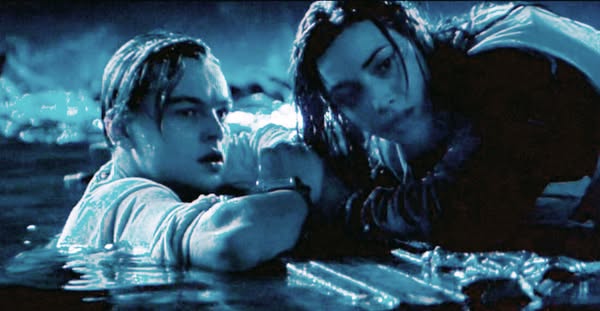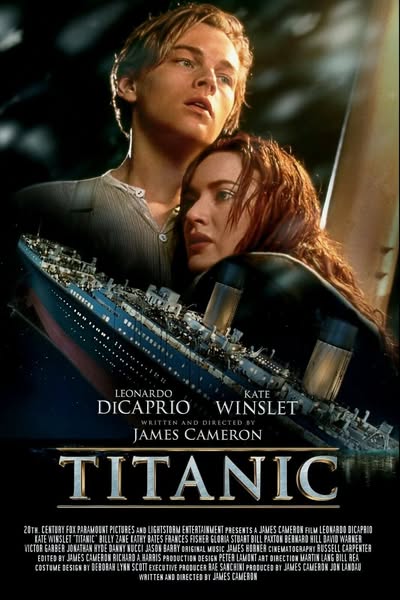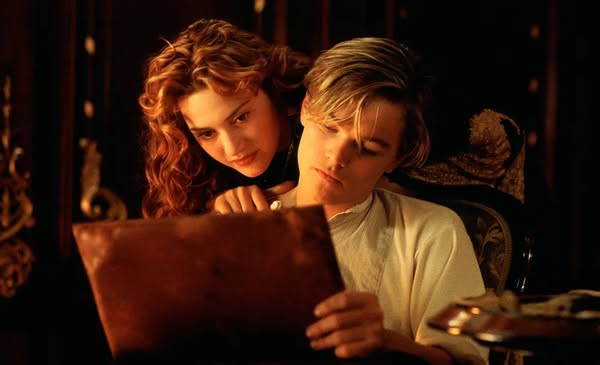Titanic (1997)

Titanic is a 1997 epic romance and disaster film that has left an indelible mark on cinematic history. Directed by James Cameron, the film seamlessly blends historical events with a poignant love story, captivating audiences around the globe. Its grand scale, emotional depth, and groundbreaking visual effects have made it a beloved classic that resonates with viewers of all ages.
The narrative centers around the ill-fated maiden voyage of the RMS Titanic, a marvel of engineering and luxury that tragically sank after hitting an iceberg. At the heart of the story is the romance between two fictional characters, Jack Dawson and Rose DeWitt Bukater, portrayed by Leonardo DiCaprio and Kate Winslet. Their love story unfolds against the backdrop of class disparity, societal expectations, and the impending disaster that looms over the ship. Jack, a penniless artist, and Rose, a young woman from a wealthy family, represent the contrasts of their social classes, making their romance both forbidden and exhilarating.

The film’s structure cleverly juxtaposes the romance with the historical tragedy, immersing viewers in both the intimate moments of the characters’ lives and the broader chaos of the sinking ship. As the Titanic embarks on its journey, viewers are introduced to a rich tapestry of characters, each contributing to the film’s emotional weight. The ship itself becomes a character, symbolizing both freedom and tragedy, as it carries hopes and dreams, only to meet a catastrophic fate.
Cameron’s direction is masterful, skillfully balancing the grand spectacle of the ship’s opulence and the harrowing reality of its demise. The film’s pacing is expertly crafted, leading viewers through moments of joy and romance before plunging them into the terror of the disaster. The visual effects were revolutionary at the time, with the depiction of the ship’s sinking blending practical effects with CGI to create a hauntingly realistic portrayal of the tragedy.

The film’s score, composed by James Horner, further amplifies its emotional impact. The haunting melodies, particularly the iconic theme song “My Heart Will Go On,” performed by Celine Dion, have become synonymous with the film. This music enhances the romantic and tragic elements, drawing viewers deeper into the narrative.
In addition to its technical achievements, Titanic explores profound themes such as love, sacrifice, and the human spirit’s resilience in the face of disaster. The characters’ journeys reflect the universal struggles of love transcending social barriers, the fight for survival, and the tragic consequences of hubris. The film invites viewers to reflect on the fragility of life and the enduring power of love, even in the direst circumstances.

Upon its release, Titanic received widespread acclaim from critics and audiences alike, becoming the highest-grossing film of its time. It won numerous awards, including eleven Academy Awards, and has since solidified its status as a cultural phenomenon. Its impact on popular culture is undeniable, inspiring countless parodies, references, and tributes.
The film’s legacy continues, as it resonates with new generations of viewers who are drawn to its timeless themes and captivating storytelling. Titanic is not just a film about a tragic event; it is a celebration of love, courage, and the human experience. Its ability to evoke deep emotions and foster connections among viewers ensures that it will remain a cherished classic for years to come.
In conclusion, Titanic stands as a monumental achievement in filmmaking, merging historical depth with a powerful love story. Its compelling narrative, unforgettable characters, and breathtaking visuals create a rich cinematic experience that continues to captivate audiences worldwide. James Cameron’s masterful storytelling ensures that the tale of the Titanic, and the love that blossomed aboard its ill-fated journey, will never be forgotten.











